John Lennon: 7 Ways That He Changed The World
The legacy of the iconic Beatle, artist, writer, and activist continues to loom large in our culture, forty years after his death.
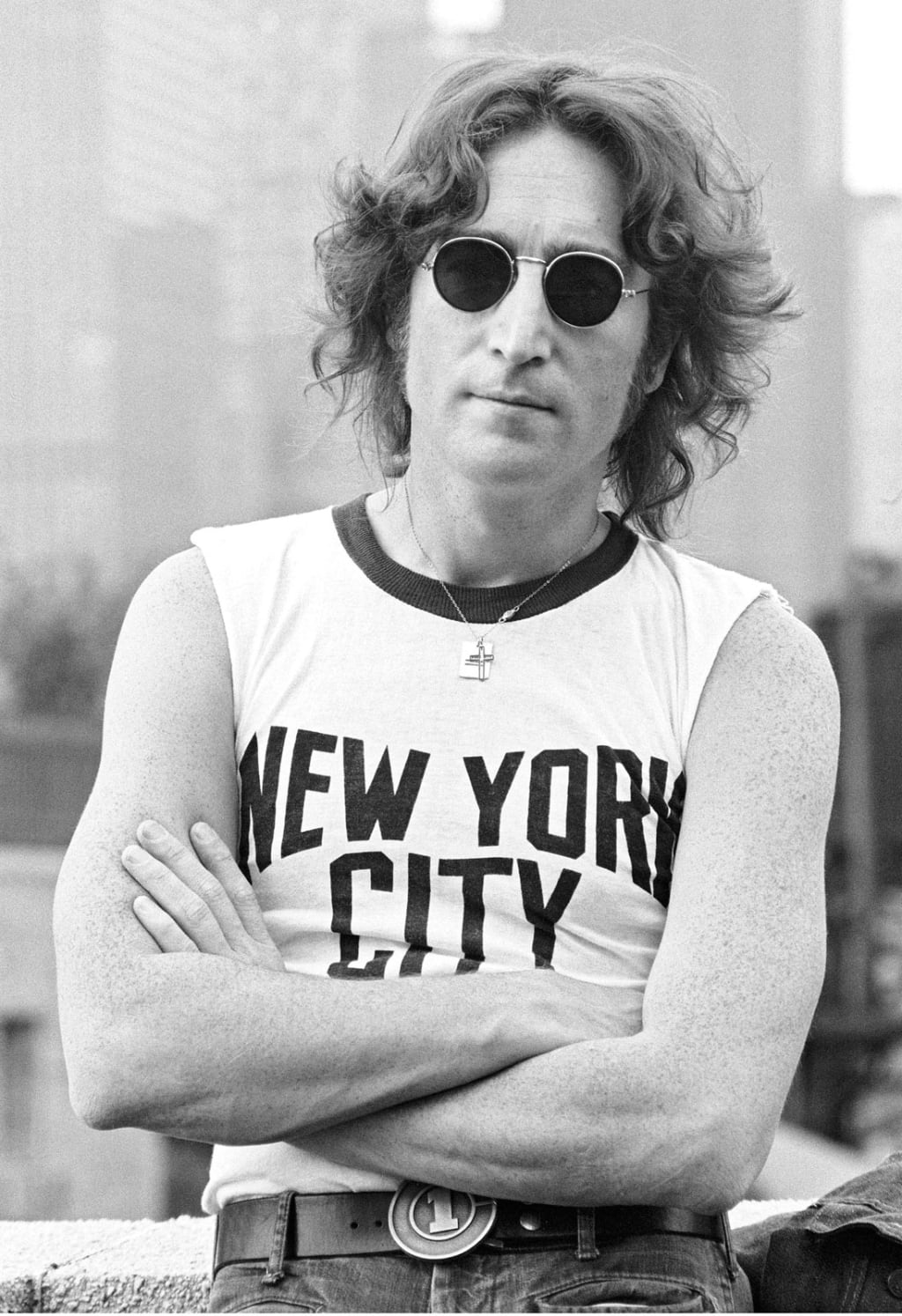
This Tuesday, December 8th, 2020, marks forty years since the tragic death of John Lennon. That means that he has now been gone for as many years as he was alive. As unfathomable as that reality is, perhaps it feels all the more astounding to us because of how prescient, influential, and indelible he remains to our culture. Lennon's music, his words, and the trailblazing means by which he led his singular, legendary life continue to inspire generation after generation, ensuring that while he may be physically gone from this Earth, his spirit remains very much alive.
The following are seven ways that his life, art, and music have shaped our world, both in his own lifetime and in the decades since.
He made being Working Class something to aspire to
Before the Beatles, celebrities usually went out of their way to disguise or hide their humble beginnings. If they originated from a low-income family or poor background, they were dissuaded by their management, studio heads, or record labels from making this widely known to the public. The entertainment business in the early-to-mid 20th century was full of stars across the film, music, and (later) TV landscape who more or less disowned their working-class roots for fear that it might hurt their image or their popularity. Even some of the Beatles' earliest idols, including Little Richard and Elvis Presley, went out of their way to flaunt their newfound wealth and success through their flamboyant fashion and opulent lifestyles. With the advent of the Beatles, the pendulum flipped the other way. In particular reference to his home country of England, Lennon explained in his last televised interview in 1975 that his band "were the first working-class singers who stayed working-class, and pronounced it." The individual Beatles, at least outwardly, did not feel it necessary to show off the material benefits of their success in ways that overshadowed their working-class origins and identity. Even their Brian Epstein-mandated suits (which were a far cry from the grittier street image of leather and jeans during their early days in Hamburg and Liverpool's Cavern Club) more or less reflected that they were of working-class origin, and it was something they exuded with pride. In their press appearances and in their film A Hard Day's Night, their deft and sarcastic humor served to stick up their nose at the pretension of older generations and exposed the long-festering class divide between the entertainment industry and its new, younger audience. Lennon in particular, who had the most sardonic wit of the four, had no patience for the status quo or the establishment and naturally rebelled against it. In the days of Beatlemania, he expressed his disdain by mocking the Queen during a Royal Variety Performance and instructing "those in the cheaper seats please clap your hands. And the rest of you just rattle your jewelry." Later, on his first solo album Plastic Ono Band, his scathing song "Working Class Hero" confronted and indicted the class system and told his listeners that "a working-class hero is something to be." This served as great inspiration for legions of aspiring musicians and artists at the time and served as a template for future icons in punk, hip hop, and beyond to utilize their working-class origins as a term of endearment and connection with their audience, who largely hailed from the same background and struggles.
He established that writing your own songs was to be expected, rather than exceptional
Lennon, along with his Beatles songwriting partner Paul McCartney, served to upend another traditional norm of the entertainment business - that pop music stars did not often write their own songs. Prior to The Beatles, popular music largely consisted of two camps - the performers and the songwriters. On one hand, you had writers such as Goffin & King (Gerald Coffin and future pop star in her own right, Carole King), who worked on an assembly line writing hit songs for up and coming performers. Similar formulas were followed in the early days of Motown and other pop and R&B acts of the time; the songwriters would write the words and the music, and the singers would perform them, becoming megastars in the process. The writers remained largely in the background, out of sight, and mostly unknown to the general audience. This all changed with the advent of the Beatles. Although other groups such as the Beach Boys were already writing and performing much of their hit material, it was not until Beatlemania ascended in 1963 and 1964 that the notion of a self-contained musical unit that wrote their own material, played their own instruments, and sang their own songs increasingly became a pop industry standard. Referencing the earlier assembly line pop songwriters, John Lennon famously said that he and Paul McCartney wanted to become the "Goffin-King of England". Coupled with the cross-over success of folk hero-turned pop iconoclast Bob Dylan, popular music in the mid-1960s began to dramatically shift away from manufactured hitmaking to organic songs of self-expression and social commentary, as opposed to simplistic tunes of teenage romance and young love. Out of all of the Beatles, Lennon was the one who was most open to self-exploration and self-reflection. Greatly influenced by Dylan in particular, his confessional songs "I'm A Loser", "Help!", "Norwegian Wood", "Nowhere Man" and "In My Life" exposed a profound vulnerability that was unprecedented for a pop star of the time (especially a male pop star, in a climate dominated by chauvinism and misogyny - more on that later). This process of self-exploration and world reflection would reverberate across the decades, with countless artists from across genres taking their cue from the Beatles - and especially Lennon - to fully express themselves and to be both brutally honest and nakedly vulnerable.
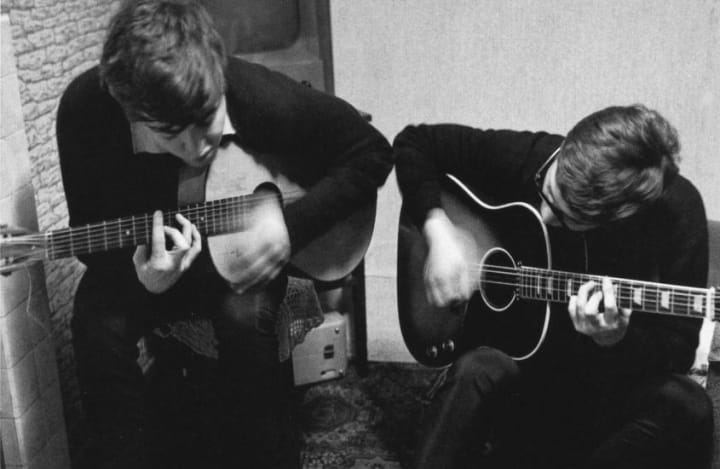
He changed the parameters of how a pop star was supposed to behave - and what pop star was allowed to say
From the outset, John stood out from the rest of the Beatles. He wasn't just a musician; he was a visual artist and an accomplished writer that had two books of creative prose and short stories published between 1964 and 1965 (In His Own Write and A Spaniard In The Works, respectfully). He also had the sharpest tongue and the slyest wit, and wasn't afraid to speak exactly what was on his mind. In the early days of Beatlemania, this was often perceived to be emblematic of the foursome's overall charm, and some of his resentment towards and criticism of the status quo were not-so-carefully disguised by the power of the band's wholesome image. Naturally outspoken while also painfully insecure, John used humor as both a weapon and a shield. From the moment the band first stepped foot on American soil at New York's Kennedy airport, the press were treated to his trademark sarcasm and biting commentary. Press: "Are there some doubts that you can sing?" John: "No, we need money first." Press: "What do you think your music does for these people...why does it excite them so much?" John: "If we knew, we'd form another group and be managers." This was behavior that was completely left field and unexpected by the media establishment of the time. However, the unprecedented popularity of the Beatles allowed John to get away with challenging those assertions of how a pop star was to behave. That is until 1966, when his off the cuff comment that his band was "more popular than Jesus" would land him - and the other three Beatles - in a firestorm of controversy in the United States. While touring the country's Bible belt that summer, the band (and John in particular) were met with boycotts, bonfires of Beatle records and memorabilia, and death threats. Eventually, John was forced to apologize publicly in front of the cameras, but not before stating that "had it said television was more popular than Jesus, I might have got away with it." Since John's complete reshaping of who a pop star can be and what they can say, the ensuing decades have seen no shortage of successive music icons using their platform to speak their mind without reserve or apology - everyone from Jim Morrison to Madonna, Tupac Shakur to Eminem, and - most recently - Kanye West.
He bridged the Arts, Politics & Activism in ways that are mirrored by today's biggest cultural movements
Before John Lennon, no one in pop music so effectively married the personal and the political. With John, he saw the two as being inextricably linked. Even his closest peer and contemporary, Bob Dylan, did not possess the gift of making social commentary reflect the deepest hopes and fears of one's individual soul and conscious the way that Lennon did. The mid-'60s saw exponential growth for John, musically, intellectually, and psychologically. Not only was his songwriting maturing and evolving, but so was his interpretation of world events unfolding around him. He was one of the first major celebrities of the time to speak out fervently against the Vietnam War. Like much of his generation, he recoiled from the increasing hostility and violence that permeated the social and political climate. In songs like "The Word" (off of Rubber Soul) and especially "All You Need Is Love", he lent significant credence to a collective hope that love would save us all. Of course, as the revolutionary '60s continued to progress, many of those hopes were scattered to the wind amidst riots, assassinations, and escalating conflict. John responded to the melee by writing the song "Revolution", with its famous line "when you talk about destruction, don't you know that you can count me out." Lennon was asserting that if he had to make a choice, he would personally reject violent altercation whenever possible. On popular TV talk program "The Dick Cavett Show", he explained: "If I am a revolutionary, or we are revolutionaries, we are revolutionary artists - not gunmen." He followed this up with an anthem for the ages, "Give Peace A Chance." The impact was enormous and immediate; months after the single's release, tens of thousands of people who had assembled in Washington DC for the largest anti-war protest in history were singing the repeated refrain of the song's chorus, much to the chagrin of US President Richard Nixon. Nixon was so threatened by the sway and power that John held over his audience, that he and his administration utilized the FBI's illegal COINTELPRO surveillance to open a file on him. John, and his new love and partner Yoko Ono, were beginning to blur the lines between their art and direct political action and activism. Once they decided to relocate from England to the US, they took up with many figures of the American Left, including Yippie movement founders Abbie Hoffmann and Jerry Rubin, as well as Black Panther Party co-founder Bobby Seale. In 1971, John & Yoko's appearance at a Michigan benefit concert for incarcerated activist John Sinclair overnight effectively reversed the decision of the Michigan courts to hold Sinclair indefinitely. By the following year US Immigration and Customs, at the behest of the Nixon Administration, began a long and arduous battle to have Lennon kicked out of the country. Throughout it all, John's creativity didn't waver, and he continued to release songs and albums that addressed his personal desire for, and commitment to, fundamental societal change. Songs like "Happy Xmas (War Is Over, If You Want It)", "Power To The People", "Gimmie Some Truth", and most famously "Imagine", challenged his audience with a vision of what was possible if we only dared to imagine a world without war, without violence or division based on race, class, or religion. The fearless means by which John put his livelihood, his career, and his reputation on the line to stand for a cause he believed to be right has inspired people around the world in the decades since. He wasn't the only famous celebrity of his time to make this sacrifice (Muhammad Ali comes to mind), but it served as a blueprint for future public figures to emulate as they strove to use their enormous platforms in addressing inequality and injustice.
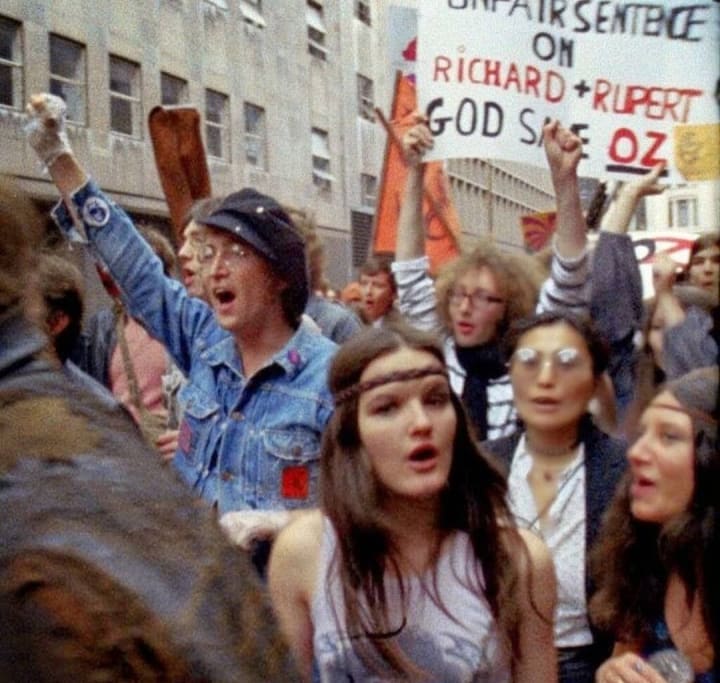
He (and Yoko Ono) invented the Reality Show
The impact that Yoko Ono had on John Lennon's life and art cannot be overstated. An artist in her own right, Yoko was instrumental in releasing John from the confines of being merely a Beatle, and gave him the courage and motivation to express himself freely without compromise. Many of the creative impulses that he had always buried, or relegated to the sideline in the wake of the Beatles' massive celebrity, now were suddenly brought to the forefront. He even credited her for inspiring and co-writing his signature solo song, "Imagine". John and Yoko also made the pioneering decision to document every aspect of their life, both the public and private. This had never been facilitated before by celebrities of their caliber and status. As a part of their brand of art and activist theater, they would bring a film crew wherever they went; hosting their two Bed-In's for peace (one in Amsterdam, the other in Montreal), holding press interviews under a bag, private moments at their home and inside their bedroom, spending quality time with family, friends, and distinguished peers, producing their music and creating accompanying videos and experimental films. Much of this footage - some endearing, others explicit - were often publicly disseminated through avante-guard film screenings, television broadcasts, art gallery exhibits, or their joint albums of musical experimentation. Their first music project together, the sonic collage of Two Virgins, famously featured a naked picture of the couple on its cover that was so offensive to vendors at the time that it had to be distributed in a brown paper bag. Nothing about their life together was off-limits, and the public was invited to not only witness but to actively participate. When the song "Give Peace A Chance" was recorded live in their Montreal hotel room during the Bed-In, they invited their supporters, followers, and throngs of media and reporters to take part in the performance. At the time, much of the public did not know what to make of this, as nothing like it had ever quite been done before. Many, including frustrated Beatles fans, lashed out with cynicism and dismissiveness. Over time, however, the full extent of how ahead of their time John and Yoko were has become undeniable. In this era of reality TV and social media, everyone is living their lives publicly - for better or for worse. Some media figures are harnessing the power of social media to bring awareness to important causes, just as the Lennons did. Others are simply using it for popularity and notoriety. As John and Yoko's friend and peer Andy Warhol once stated, "In the future, everyone will be world-famous for 15 minutes." As a society, we have now arrived at that future.
At the height of his fame, he walked away to become a Househusband
Following the birth of his second son Sean in 1975, John Lennon made the decision to retire from public life to raise his child. Moreover, he elected to become a stay at home dad and to have Yoko take over managing the family business. This reversal of gender roles within the traditional family dynamic was an extraordinary reconfiguring of society's expectations up until that time, and represented another revolutionary act from Lennon. It was one thing for a woman of John's celebrity and stature to step back from the limelight and raise a child after giving birth, but for a man of John's status to walk away from it all at the peak of his career was nearly unheard-of. To people familiar with John's life story, it is not uncommon knowledge that he wasn't the best father to his son Julian, from his first marriage to Cynthia Powell. Julian had been born just as the Beatles were on the verge of becoming worldwide superstars, and life on road meant that John saw very little of his child during those important and formative years. Following their divorce, Cynthia was granted custody of Julian, which meant that as John's new life with Yoko progressed he saw even less of his son. John himself had been abandoned by both his mother and father as a child, and he felt guilty that he'd essentially repeated the sins of his parents. Once Yoko gave birth to their son, he made the conscious choice that he was going to spend as much time as possible in his new baby's life. At the same time, he entrusted the handlings of his considerable fortune to his wife, who came from a Japanese family of bankers and had had the propensity to manage their business affairs. From the mid-1970s until his decision to come out of retirement in 1980, John spent nearly every waking moment caring for Sean; he nurtured him, fed him, bathed him, taught him how to swim, and took him for walks in Central Park, across from the Dakota apartment building in New York City where the Lennons lived. Lennon's peers and fans were perplexed that one of the most important and consequential people of his time had decided to completely eschew the roller coaster ride of fame and success to be a stay at home dad, or as John proudly proclaimed it, a "househusband" (he would later address this on "Watching The Wheels", from his last album Double Fantasy). While the image of the former rock and roll rebel spending days in the kitchen baking bread may have been confusing for some, for others it was inspiring. For many men, in particular, it opened their minds to the reality that manhood was not necessarily rooted in being the partner who went to work every day or being the economic provider or breadwinner. The same as the 1970s and '80s saw a rise in women asserting themselves and pushing for equality in both the workplace and at home, simultaneously (albeit slowly), the role of men in society began to change. Today, it is not uncommon for men to stay at home and raise the children while the wife and mother pursues her career and provides for the family. It has been many decades coming, but much can be attributed to the example John set for the evolution of gender roles in relationships.

He abandoned his earlier machismo and - with Yoko’s guidance - learned to embrace feminism.
By his own admission, John was a man who had grown up prone to confrontation and aggression. He was often angry and abrasive, verbally combative, and used sarcasm to hide his sensitivity and keep people at bay. He was also known to unleash the worst of his tendencies on those closest to him; nowhere was this more apparent than in his relationships with women. Both his high school girlfriend Thelma Pickles and his first wife Cynthia Powell recounted times in his youth where he had hit them in moments of jealousy or rage. Fame would only serve to reinforce his indulgences and his womanizing, as he disregarded his wife and engaged in adultery throughout most of the Beatles' heyday. This behavior was not an anomaly for a man of his celebrity and status at that time, but it served as a problematic contradiction that someone who often wrote about the importance of love and peace was capable of such callousness. Enter Yoko Ono. Over the course of their twelve years together, Yoko did much to reform John's chauvinism and cavalier disposition towards women. Right from the beginning, John became the student and Yoko the teacher. His nickname for her was "Mother", because she represented both a maternal figure as well as a mentor, lover, and creative partner. She taught him about gender inequality, educated him on the burgeoning women's liberation, and introduced him to the concepts being espoused by leaders in the feminist movement. In turn, John was adamant to make sure that Yoko shared accreditation on all of their campaigns and artistic projects, and he pushed for the public to accept her as an equal partner in all of his endeavors (this acceptance was initially begrudging at best, and was rooted both in sexism and racism toward Yoko's Japanese heritage). John's attitudes and outlook were undergoing a radical transformation, but that didn't mean there weren't stumbles along the way. Starting in 1973 their relationship began to unravel, leading to a period of excess and debauchery that he later called his "Lost Weekend". After spending 18 months living with the couple's personal secretary May Pang (Yoko's handpicked mistress for John during this time), he eventually found his way back to his wife. Following the birth of their son Sean, he committed himself unconditionally to his family and worked tirelessly to repair his marriage. As previously discussed, he put his wife in charge of their business affairs while he stayed at home to raise their child. He also sought to reclaim his path towards feminist enlightenment. Years later, Yoko would recall finding John in bed at the Dakota reading a book called The First Sex, which detailed how women's contributions to civilization were greater than men's, but that throughout history they weren't given any credit at all. He suddenly began to cry, turned to his wife and said, "I didn't know we were doing this to women." By the time he began writing for his final album Double Fantasy, John was ready to come to terms with the sins of his past; on songs like "Woman", he seemed to be asking for forgiveness not only from Yoko but all the women he had wronged or hurt in his life. It was a far cry from the machismo he had displayed as a younger man, but one of the greatest things about John was his willingness to own his mistakes, and his desire to evolve and become a better person.
One can only imagine what new paths he might have forged for our culture and society had he not been taken from us so viscously.

- Written by Justin Thomas (12/07/2020)
About the Creator
Justin Thomas
Filmmaker, Visual Artist, Writer based out of Brooklyn, NY. Passions include Cultural History, Social Justice, Music, Film, & The Creative Arts, Health & Wellness, and Travel.

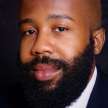

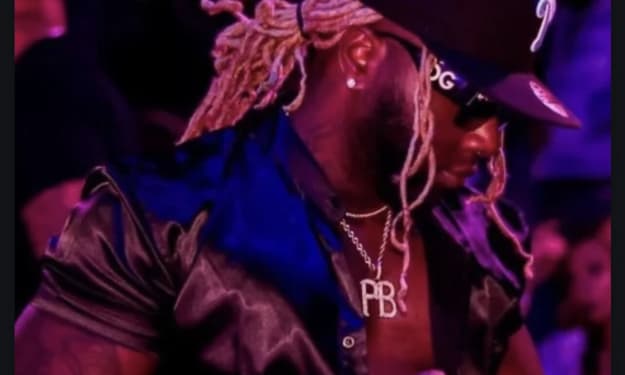


Comments
There are no comments for this story
Be the first to respond and start the conversation.